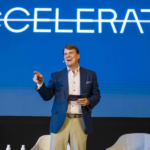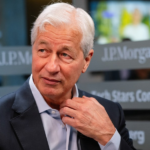Farley’s message was both a rallying cry and a stark warning: He fears that China—through relentless investment and cohesive strategy—is rapidly accelerating ahead of the United States in manufacturing and critical technologies. When asked how America’s essential economy compares with what he sees worldwide, Farley responded: “We’re far behind … It is pretty humbling when you look at where we are with our essential economy, society’s acceptance and recognition for the importance of these jobs.” Farley urged American businesses and policymakers to close the gap: “We really need to put our money where our mouth is.”
The Ford chief executive discussed his visits to other countries with advanced manufacturing, and he described a sinking feeling as he realized that America is not making the investments he believes are necessary to keep pace: “When you go to China, South Korea, Japan … what they do is they invest. They really invest.” Farley briefly discussed President Trump’s trade policy and economic priorities, saying, “You can agree or disagree with his policies, but I wonder how they fit with the essential economy.”
He said he was struck by the sustained investment and societal respect for skilled labor roles in countries like China and Japan, where middle-class jobs in the trades are transformative and widely respected. He reported witnessing robust apprenticeship programs and cohesive government strategies that ensure these sectors remain vital, productive, and attractive to new generations. In stark contrast, Farley lamented that the U.S. has undervalued its essential workforce—builders, movers, and fixers—allowing chronic shortages to develop and leaving the economy vulnerable.
Farley’s comments intersect with current national policy debates, including the Trump administration’s focus on reshoring manufacturing and increasing vocational training. While praising intent, Farley cautioned that current policies alone will not solve the demand crisis; as production expands domestically, the absence of a skilled workforce could drive up costs, create delays, and ultimately hurt both businesses and consumers.
One of those leaders, Michigan Gov. Gretchen Whitmer, sat down for a separate panel at Ford’s summit. She insisted that America is still in the lead on manufacturing, but said she’s “very sober about the fact that we cannot let our guard down,” citing fierce competition from China in particular. The two-term Democrat, who has been floated as a potential future presidential candidate, was blunt when asked about the stakes of America failing to invest: “China will dominate,” she warned, saying that a failure to compete would cost the U.S. “good-paying jobs, it’ll cost us intellectual leadership, it’ll cost us on almost every front.”
Whitmer raised an example from her recent visit to the Munich global auto show in September, saying most displays were from Chinese companies. “We have to take this very seriously or it will have dire impacts for all of us.” She warned of how Chinese state-backed firms get government support, allowing them to undercut local rivals on price, saying this has had a “devastating impact on the industry in Europe. You can’t let that happen here.”
According to Farley, Ford is now measuring technician shortages globally and expanding partnerships to recruit and train new workers. The company is collaborating with local trade schools, unions, and veterans organizations to build sustainable pathways into the trades, while also advocating for major regulatory reform and greater investment from government and philanthropic sectors.
They called for expanded career tech education, reformed apprenticeships, and deeper partnerships with unions, veterans’ groups, and community colleges, echoing models seen in Germany and East Asia. “We’ve done ourselves a disservice by advocating only one path to prosperity,” she said. A four-year college degree, she added, “is a good path for many people, but it’s not the right path for every person.”
Whitmer pointed out that plumbers make a great living. “You can be your own boss … You can start your own business. And those jobs were not as valued over the last couple of decades as they should have been.” She added that she hoped AI changes that for the better, as it helps people realize that some things can’t be replaced by technology: “Hopefully, we start to put the value back on some of those jobs that make our lives possible … and make our lives run.”
When asked about tariffs and their impact on Michigan, Whitmer said she’s “not against all tariffs per se” but repeated the saying “When America catches the cold, Michigan gets the flu” and raised the story of her driver named Eric. He owned three trucks and had his own trucking company, she said, but he “had to walk away from the business because of tariffs. People were too uncertain. They weren’t shipping at a rate that he could stay in business.”
Whitmer reiterated that Michigan’s border with Canada is the most crossed border in North America, with auto parts going back and forth eight times on average. “When you have capricious policy around tariffs, it absolutely paralyzes investment and creates greater costs on all the goods that we expect, all the goods that we rely on … This most recent eight months has absolutely created so much hardship on big and small business alike, and we’re feeling it more than any other state because of the nature of our economy.”









